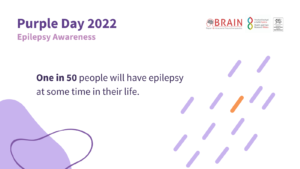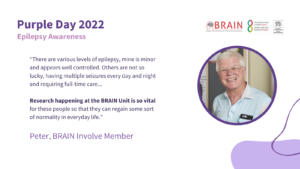Purple Day for Epilepsy: Peter’s story
Purple Day for Epilepsy takes place every year on March 26. To mark the global awareness day this year, Peter Roberts from BRAIN Involve has kindly shared his own story of being diagnosed with epilepsy and how he has supported neuroscience research at Cardiff University over the past two decades.
Peter’s first epileptic seizure was in the bathroom on 12th September 1994. It was followed by another seizure the next month and another in March 1995. Peter visited the hospital for a check-up and minor scan and no cause was found, but it was thought to be idiopathic epilepsy.
Peter said: “My doctor placed me on Epilim Chrono and I lost my driving licence for a year. As I worked in Aberdare and I had to travel to and from Barry, this caused a few problems, especially as commuting by train wasn’t totally reliable.
“I was taken off the tablets in 2006 but in 2007 I had another seizure and lost my licence again for a year. I have, as a precaution, stayed on Epilim ever since. To this day no cause has been found for my problem.”

Peter’s diagnosis of idiopathic epilepsy and the medication he takes to manage the condition have had an impact on his life.
He added: “Losing my driving licence has been the greatest inconvenience for me and I think Epilim has caused me recurring minor skin problems. It has also impacted my wife to a minor degree as she is always there to check I’m taking the tablets!”
After his diagnosis, Peter was asked to join the WERN group (Welsh Epilepsy Research Network): a group of people with epilepsy, led by doctors and researchers from Cardiff University, who met once a month to discuss their experiences and challenges.
Peter said: “Patients and family members were welcome at the WERN meetings which were held in Cardiff or Bridgend. One of the main doctors was Dr Cheney Drew and when this group folded, Cheney asked me if I would join BRAIN Involve. I gladly accepted and the rest is history.
“I have talked to researchers, students, and patients about likely problems and now meet people with Multiple Sclerosis, Parkinson’s Disease, and Huntington’s Disease.
“There are various levels of epilepsy, mine is minor and appears well controlled. Others are not so lucky, having multiple seizures every day and night and requiring full-time care. This is bound to have an effect on their education, job prospects, and all that follows in their future life.
“Research, like the work happening at the BRAIN Unit, is so vital for these people so that they can regain some sort of normality in everyday life. I’m really pleased to play my part in supporting the research by being a member of BRAIN Involve.”
BRAIN Involve is a public involvement group made up of people who are, or have been, directly affected by neurological diseases such as epilepsy, Huntington’s disease (HD), Multiple Sclerosis (MS) or Parkinson’s disease (PD).
By bringing their personal experiences to the research table, members contribute to the design, development, implementation, and dissemination of the BRAIN Unit’s research around brain repair and developing new therapies for brain conditions.

Peter concluded: “Sharing our lived experiences of epilepsy and other neurological diseases at BRAIN Involve can really have an impact on shaping the neuroscience research happening at Cardiff University and increase awareness of these conditions.
“If any member of the public knows of a family member or friend within any of the four problem areas listed above, please come along to our next meeting. We are currently meeting virtually and you would be very welcome. Never be afraid of asking for help, there will always be someone only too glad to be of assistance.”
BRAIN Involve brings together patients, carers, and academics to shape cutting-edge research into neurological and neurodegenerative diseases. You can find out more about how to get involved on our website.
A special thanks to Peter for sharing his story for Purple Day 2022.



